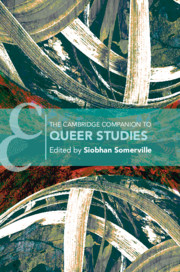Book contents
- The Cambridge Companion to Queer Studies
- The Cambridge Companion to Queer Studies
- Copyright page
- Dedication
- Contents
- Figures
- Contributors
- Acknowledgments
- Chronology
- Introduction
- Part I Genealogies
- Part II Confluences
- Chapter 3 Convergence, Dissymmetry, Duplicities
- Chapter 4 Transgender Studies, or How to Do Things with Trans*
- Chapter 5 Queer Indigenous Studies, or Thirza Cuthand’s Indigequeer Film
- Chapter 6 Queer Disability Studies
- Chapter 7 Queer Ecologies and Queer Environmentalisms
- Part III Representation
- Part IV Key Words
- Index
- Cambridge Companions to …
- References
Chapter 7 - Queer Ecologies and Queer Environmentalisms
from Part II - Confluences
Published online by Cambridge University Press: 02 June 2020
- The Cambridge Companion to Queer Studies
- The Cambridge Companion to Queer Studies
- Copyright page
- Dedication
- Contents
- Figures
- Contributors
- Acknowledgments
- Chronology
- Introduction
- Part I Genealogies
- Part II Confluences
- Chapter 3 Convergence, Dissymmetry, Duplicities
- Chapter 4 Transgender Studies, or How to Do Things with Trans*
- Chapter 5 Queer Indigenous Studies, or Thirza Cuthand’s Indigequeer Film
- Chapter 6 Queer Disability Studies
- Chapter 7 Queer Ecologies and Queer Environmentalisms
- Part III Representation
- Part IV Key Words
- Index
- Cambridge Companions to …
- References
Summary
This chapter offers an overview of the conceptual framework of queer ecology – which interrogates the relationship between the categories of “queerness” and “nature.” In the first section, Seymour traces this framework’s history and deployment by academics, artists, and activists, and also attends to its oversights. She argues that queer ecology has made foundational, though sometimes underrecognized, contributions to the larger nonhuman turn in the humanities. The second section turns to primary sources, using queer ecology and the related framework of trans ecology to read two works of contemporary US literature, Edward Abbey’s novel The Monkey Wrench Gang (1975) and Oliver Baez Bendorf’s poetry collection The Spectral Wilderness (2015). Seymour shows how Abbey’s novel tries, unsuccessfully, to oppose the transformativity of nature to the transformativity of sex and gender; meanwhile, Bendorf’s poetry offers an alternative to this line of thought by drawing innovative parallels between the category of the vegetal and the transgender human body.
Keywords
- Type
- Chapter
- Information
- The Cambridge Companion to Queer Studies , pp. 108 - 122Publisher: Cambridge University PressPrint publication year: 2020
References
Further Reading
- 5
- Cited by



